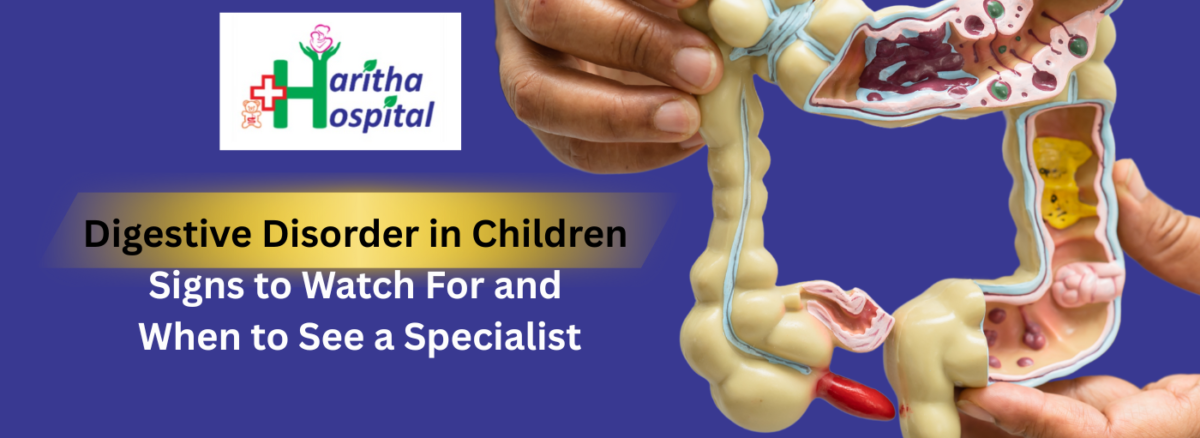Digestive Disorder in Children: Signs to Watch For and When to See a Specialist
Digestive Disorder in Children: A healthy digestive system is crucial for a child’s growth and overall well-being. However, children often experience digestive issues that range from mild discomfort to serious conditions requiring medical intervention. As a parent, recognizing the warning signs of digestive disorders can help you seek timely treatment. If you’re looking for the Best Pediatric Gastroenterologists hospital in KPHB or the Best Pediatric Gastroenterologists hospital in Nagole, understanding when to consult a specialist is essential.
Common Signs of Digestive Disorders in Children
Digestive issues in children can present in various ways, some of which may be temporary while others indicate a chronic condition. Here are some common signs to watch for:
1. Persistent Abdominal Pain
- Occasional stomachaches are normal, but chronic or severe abdominal pain could be a sign of an underlying issue such as irritable bowel syndrome (IBS), gastritis, or food intolerances.
2. Frequent Vomiting or Nausea
- While occasional vomiting is common in children, frequent episodes may indicate gastroesophageal reflux disease (GERD), infections, or digestive blockages.
3. Chronic Diarrhea or Constipation
- Recurring diarrhea could be caused by food allergies, infections, or inflammatory bowel disease (IBD).
- Long-term constipation may be linked to dietary issues, dehydration, or conditions like Hirschsprung’s disease.
4. Blood in Stool
- Bright red blood may indicate anal fissures, while dark or tarry stools can suggest internal bleeding due to ulcers or Crohn’s disease.
5. Unexplained Weight Loss & Poor Growth
- If a child is losing weight or not growing as expected, it could be due to malabsorption conditions such as celiac disease or chronic liver disease.
6. Excessive Bloating & Gas
- Frequent bloating can be a sign of lactose intolerance, small intestinal bacterial overgrowth (SIBO), or gluten sensitivity.
7. Loss of Appetite
- A prolonged loss of interest in food could indicate digestive discomfort, acid reflux, or underlying medical conditions.
8. Difficulty Swallowing
- If a child experiences pain or difficulty swallowing, it may be due to esophageal conditions like GERD or eosinophilic esophagitis.
When to See a Pediatric Gastroenterologist
While some digestive issues resolve on their own, persistent or severe symptoms require evaluation by a pediatric gastroenterologist. Here’s when you should seek specialized care:
1. Symptoms Persist for More Than Two Weeks
- Chronic digestive problems lasting beyond two weeks may indicate a more serious condition requiring medical attention.
2. Severe Pain or Discomfort
- Intense abdominal pain, especially if it interferes with daily activities, should be assessed by a specialist.
3. Blood in Vomit or Stool
- Any sign of blood in vomit or stool is a medical emergency and should not be ignored.
4. Significant Weight Loss or Growth Issues
- If a child is not meeting growth milestones, a digestive disorder might be preventing proper nutrient absorption.
5. Recurring Infections or Weak Immune System
- Frequent infections, fatigue, and poor immunity can be linked to gut health and require a pediatric gastroenterologist’s evaluation.
Diagnosing Digestive Disorders in Children
When you visit the best pediatric gastroenterologists hospital in KPHB or Nagole, the specialist may use various diagnostic tests to determine the root cause of the issue:
1. Physical Examination & Medical History
- Doctors will review the child’s medical history and perform a physical exam to assess symptoms.
2. Laboratory Tests
- Blood, stool, and urine tests can help detect infections, inflammation, and nutritional deficiencies.
3. Imaging Studies
- Ultrasounds, X-rays, and MRI scans can identify structural abnormalities in the digestive tract.
4. Endoscopic Procedures
- Procedures like endoscopy and colonoscopy allow doctors to directly examine the digestive system and collect biopsy samples if needed.
Treatment Options for Pediatric Digestive Disorders
Depending on the diagnosis, treatment options vary. The best pediatric gastroenterologists hospital in KPHB and Nagole will offer the following approaches:
1. Dietary Modifications
- Avoiding trigger foods for allergies and intolerances.
- Incorporating fiber-rich foods and probiotics to promote gut health.
2. Medications
- Antibiotics for bacterial infections.
- Acid suppressors for GERD.
- Anti-inflammatory drugs for conditions like IBD.
3. Nutritional Support
- Supplements for vitamin deficiencies.
- Special diets for conditions like celiac disease.
4. Surgery
- In severe cases, surgical intervention may be needed for conditions like appendicitis or intestinal obstructions.
Finding the Right Pediatric Gastroenterologist
If you’re searching for the “Best Paediatric Gastroenterologists hospital in KPHB” or “Best Paediatric Gastroenterologists hospital in Nagole,” consider the following factors:
- Experience and expertise in pediatric digestive disorders.
- Availability of advanced diagnostic and treatment facilities.
- Child-friendly environment with compassionate care.
- Positive patient reviews and recommendations.
Conclusion
Recognizing the early signs of a digestive disorder in children is vital for timely treatment and better health outcomes. If your child exhibits persistent digestive symptoms, it’s best to consult a pediatric gastroenterologist. The best pediatric gastroenterologists hospitals in KPHB and Nagole offer specialized care to diagnose and treat a range of gastrointestinal conditions, ensuring your child’s long-term health and well-being.

